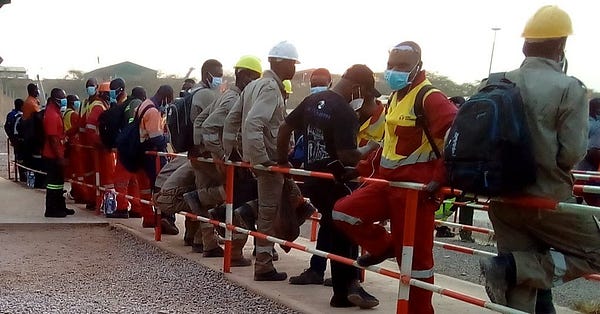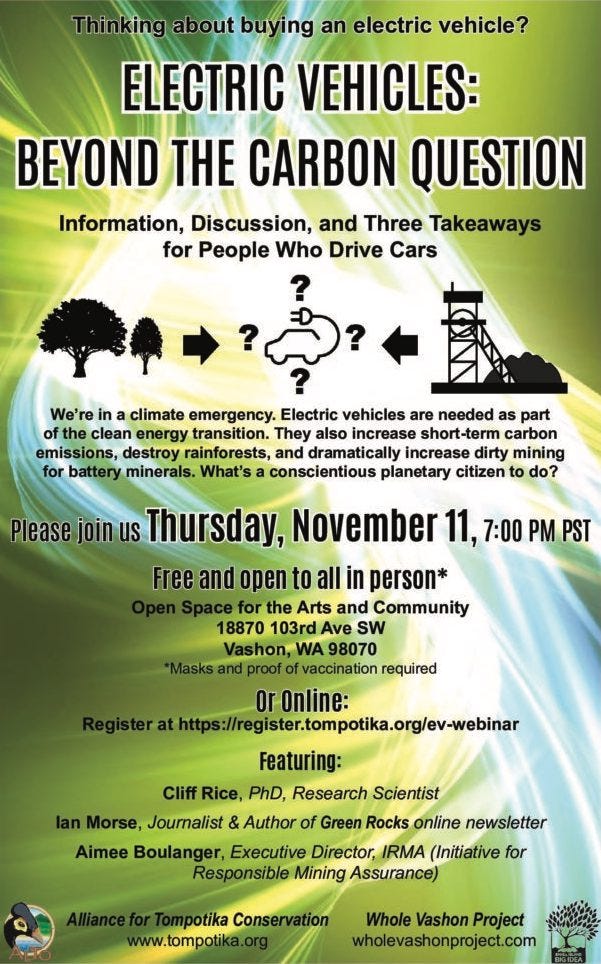Transport day at COP26 and an EV event
In the few agreements that did happen, climate is still going metal
Climate technologies require enormous amounts of metal. I’m Ian Morse, and this is Green Rocks, a newsletter that doesn’t want dirty mining to ruin clean energy.
Wednesday was Transportation Day at the UN climate conference, COP26.
Before we cover a bit about the news and views that are emerging, I’ll highlight an event today where I’ll join a panel to discuss electric vehicles and their materials.
The event was inspired in part by this newsletter. Just as I began focusing on nickel mining on Sulawesi island in Indonesia, the Alliance for Tompotika Conservation has seen those mines encroaching on forests and villages. In 15 years of work, the group has seen major success in helping local communities merge lifestyles with wildlife conservation. And, incidentally, they are based on an island near Seattle, where I live.
Today, the alliance and the climate-focused Whole Vashon Project will host a discussion on these mines and many others that funnel materials to electric vehicles. Topics will have a lens tuned for consumers and lay people. It will be both in-person and online.
In addition to the members of the alliance, I’ll be joined by Aimee Boulanger, executive director of the Initiative for Responsible Mining Assurance, which promotes likely the industry’s most rigorous mining standard. A local radio station interviewed me on Tuesday to get more details about the event. Register for the webinar online here.
Transportation day at COP26 tried to pack both a lot and not enough into one day. The schedule was overwhelmingly devoted to electric road transport.
For context, global emissions from transportation comprise between a fifth and a quarter of all emissions (in the US, it’s 29%). Within that chunk, transportation could mean individual cars as well as heavy-duty vehicles, aviation and shipping.
Emissions from passenger cars, however, are rising the fastest, as people drive more and more people own cars. If those cars are to be swapped for electrified motors, that may mean a billion or more electric vehicles must be produced. And yet, the methods used to produce these cars also release greenhouse gases. Production of steel and aluminum, for instance, make up roughly 7-10% and 2% of global emissions, respectively. When new materials are pulled from the ground, the land clearing and deforestation emits harmful gases. Emissions also come from the infrastructure for these cars: things like roads and energy capacity for charging. The “transportation emissions” figure only counts gases at the tailpipe.


Scientists have highlighted that it will be difficult to shrink tailpipe emissions without increasing emissions in other sectors — not to mention adding to threats to biodiversity and lives of people whose emissions are negligible. Finding and scaling up new mines can also take decades, which we don’t have. Researchers, activists and others around the world have put forward plenty of alternatives.
The Washington Post has both good background on the transportation talks, as well as expert recommendations that include reducing vehicle use entirely. An overhaul in transportation, they say, also means rethinking how far people must travel for work, leisure and basic necessities.
Cyclists outside the COP26 forum in Scotland protested that the conference didn’t give enough weight to bicycles as climate tools. Some say bicycles, along with e-bikes, are the quickest way to decarbonize transport. Tomorrow the agenda will target cities, but a new report says transportation and urban emissions are closely linked. Public transit, it suggests, needs to double to meet climate goals, which are already too low to keep temperatures from passing tipping points.
Indigenous rights and mining activists urged policymakers to consider the “dirty mining that’s claiming to be our way of this crisis.”




At the same time, agreements about electrifying transport are coming up weak. Major car companies and governments from top emitting countries declined to join a non-binding deal to stop selling gas cars in two decades. A few delegations pledged to achieve sales of only zero-emission trucks and buses by 2040. A train manufacturer said hydrogen needs to be on the agenda to meet net-zero goals.







